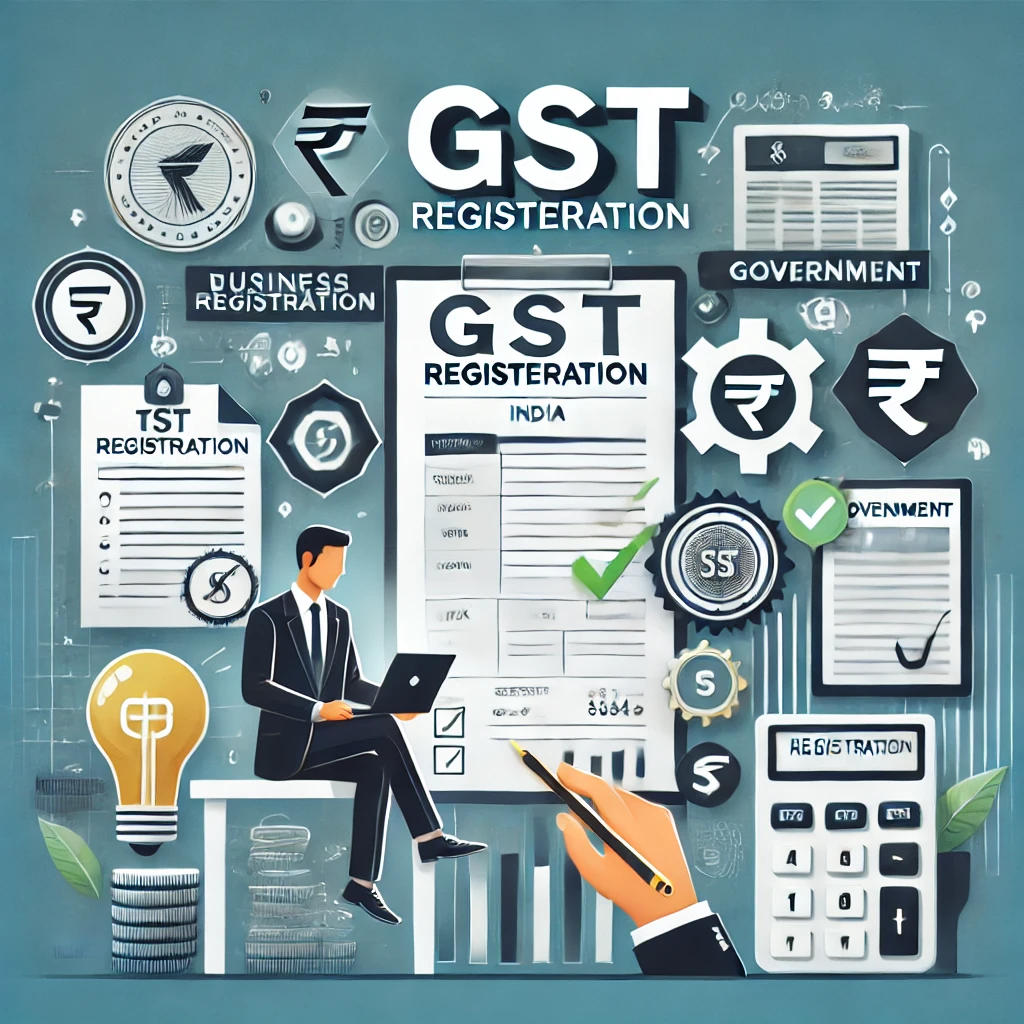Start Business
Start Business
Registration & License
Registration & License
Trademark Filing
Trademark Filing
Goods & Service Tax
Goods & Service Tax
Income Tax
Income Tax
MCA Services
Tender Registration
Tender Registration
Others
GST Registration Consultant in Delhi NCR | GST Registration Online Services
Best & Reasonable Plans
Smart solutions,fair prices - your success starts with the Innovative solutions, competitive pricing – your journey to success begins with the perfect balance for growth!

OVERVIEW
GST (Goods and Services Tax) is a unified indirect tax system implemented in India to simplify taxation and improve compliance. It eliminates multiple taxes like VAT, service tax, and excise duty, ensuring a seamless tax structure. Any business involved in the supply of goods or services with an annual turnover exceeding the prescribed limit (₹40 lakh for goods and ₹20 lakh for services) must register under GST.
GST registration is not just a legal requirement but also a strategic advantage for businesses, enabling them to operate across India without state-wise tax restrictions. It also provides input tax credit (ITC), reducing the overall tax burden on businesses. The registration process is entirely online, ensuring ease and efficiency. Once registered, businesses receive a unique GST Identification Number (GSTIN), which is essential for tax filing, invoicing, and compliance.
Key Features of GST Registration
- • Legal Business Recognition : A GST-registered business is recognized by the government, increasing credibility among clients and suppliers.
- • Seamless Input Tax Credit (ITC) : Registered businesses can claim ITC, reducing their tax liabilities and ensuring better cash flow.
- • Interstate Business Expansion : GST registration removes state-wise tax barriers, enabling businesses to operate and trade freely across India.
Who Needs GST Registration?
GST registration is mandatory for businesses and individuals whose aggregate turnover exceeds the prescribed threshold limits, which are ₹40 lakhs for goods (₹20 lakhs for special category states) and ₹20 lakhs for services (₹10 lakhs for special category states). Additionally, certain businesses must register under GST regardless of turnover, such as e-commerce sellers, inter-state suppliers, and businesses involved in export or import of goods and services. Casual taxable persons, non-resident taxable persons, and businesses opting for the composition scheme also need to register. Even if your turnover is below the threshold, voluntary registration is beneficial for claiming input tax credit (ITC) and enhancing business credibility. Failing to register when required can lead to penalties, making it essential to understand whether your business falls under the mandatory GST registration criteria.
Different Types of GST Registration in India
Normal Taxpayer
This is the standard GST registration for businesses operating in India. Any business that exceeds the prescribed turnover limit (₹40 lakh for goods and ₹20 lakh for services in most states) must register as a normal taxpayer. Businesses under this category can collect GST from customers and claim input tax credit (ITC) to reduce their tax burden. There is no requirement to deposit an advance tax, and businesses must file monthly and annual GST returns.
Composition Scheme
The composition scheme is designed for small businesses with an annual turnover of up to ₹1.5 crore (₹75 lakh for special category states). Businesses registered under this scheme pay GST at a fixed percentage of their turnover, which is lower than standard rates. However, they are not allowed to claim input tax credit and cannot collect GST from customers. This scheme simplifies compliance and reduces tax liability, making it ideal for small traders, manufacturers, and restaurants.
Casual Taxable Person
A casual taxable person is someone who supplies goods or services occasionally in a state where they do not have a permanent business establishment. This is common for businesses participating in trade fairs, exhibitions, and temporary events. To register, they must make an advance deposit of estimated GST liability. The registration is valid for 90 days and can be extended if required. This ensures that short-term businesses remain compliant with tax regulations.
Non-Resident Taxable Person (NRTP)
A non-resident taxable person (NRTP) is a business or individual located outside India but supplying goods or services within the country. Since they do not have a permanent place of business in India, they must register under this category. Similar to casual taxable persons, NRTPs must pay an advance deposit of GST based on expected sales. The registration remains valid for 90 days, with an option to renew. This ensures that foreign businesses engaging in Indian markets comply with GST laws.
Input Service Distributor (ISD)
An Input Service Distributor (ISD) is a business that receives input tax credit (ITC) on behalf of its multiple branches and distributes it accordingly. This is particularly useful for companies with a centralized billing system, such as corporate offices managing expenses for multiple branches. ISDs do not sell goods or services directly but are responsible for allocating ITC to their branches based on consumption. This helps businesses streamline their tax credits efficiently.
E-Commerce Operators & TCS Registration
Any business that operates an online marketplace, such as Amazon, Flipkart, or Zomato, must register under this category. These platforms must collect tax at source (TCS) on behalf of sellers and deposit it with the government. Even if individual sellers have a turnover below the GST threshold, they still need to register for GST to sell through these platforms. This registration ensures tax compliance for online businesses and helps track transactions effectively.
Special Economic Zone (SEZ) Units & Developers
Businesses operating in Special Economic Zones (SEZs) enjoy tax benefits and exemptions under GST. Companies registered as SEZ units or developers must obtain a separate GST registration to avail themselves of these benefits. SEZ businesses typically deal in exports and receive various tax incentives, such as zero-rated supplies, which exempt them from paying GST on exports while allowing input tax credit claims.
GST Registration for Government Bodies & UN Organizations
Certain government departments, embassies, and United Nations (UN) organizations that engage in taxable activities must obtain a Unique Identification Number (UIN) under GST. This registration allows them to claim refunds on GST paid for official purchases while ensuring transparency in tax collection. This category is primarily for organizations that do not operate as commercial businesses but still interact with GST-registered suppliers.
Silent Features
Single Registration for Multiple States
Voluntary Registration
Composition Scheme
E-commerce Seller Registration
Temporary Registration
Input Tax Credit (ITC) Benefits
Advantages of GST Registration
- Improved Access to Government Tenders : GST registration is often a prerequisite for participating in government tenders and contracts, opening up new business opportunities for registered entities.
- Enhanced Business Reputation : Being GST-registered boosts your business’s credibility and trustworthiness, making it more attractive to customers, suppliers, and investors.
- Simplified Interstate Transactions : GST eliminates the complexity of multiple state-level taxes, making interstate trade smoother and more cost-effective for registered businesses.
- Eligibility for Export Benefits : GST-registered businesses can claim refunds on taxes paid for exports, making it easier to compete in international markets.
- Digital Compliance and Transparency : GST registration integrates businesses into a digital ecosystem, ensuring transparency, reducing manual errors, and streamlining tax compliance.
- Access to Input Tax Credit (ITC) Across the Supply Chain : GST registration allows businesses to claim ITC not just on goods but also on services, reducing overall tax liability and improving profitability.
Documents Required
PAN Card of the Applicant
Aadhaar Card
Business Registration Proof
Bank Account Details
Digital Signature (if applicable)
Address Proof of Business Place
Step-by-Step Guide For Registration Process
Here are 5 steps to complete your registration process
Step 1
Create an Account on the GST Portal
Step 2
Fill in the Application Form (GST REG-01)
Step 3
Upload Required Documents
Step 4
Verification by GST Authorities
Step 5
Receive the GST Registration Certificate
Empowering Your Business to Stay Ahead


Ensuring excellence in every aspect of business operations

Helping businesses to stay ahead of the competition effectively

Providing expert guidance for long-term business growth





